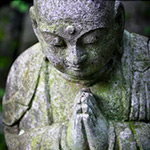 Practice discussion is a less formal meeting with a dharma mentor than dokusan. Although there is no standard length of meeting- it could run anywhere from a few minutes up to an hour- typically a meeting is between a quarter to half an hour during which time a student may bring up practice-related questions, present their understanding of the Dharma, and more generally engage in a discussion of their experience in zazen and its intersection with daily life. Personal issues such as relationships or jobs are appropriate topics in terms of how they relate specifically to one’s practice. Thus the explicit focus is on the students’ understanding of Buddhist teachings as they relate to their daily practice.
Practice discussion is a less formal meeting with a dharma mentor than dokusan. Although there is no standard length of meeting- it could run anywhere from a few minutes up to an hour- typically a meeting is between a quarter to half an hour during which time a student may bring up practice-related questions, present their understanding of the Dharma, and more generally engage in a discussion of their experience in zazen and its intersection with daily life. Personal issues such as relationships or jobs are appropriate topics in terms of how they relate specifically to one’s practice. Thus the explicit focus is on the students’ understanding of Buddhist teachings as they relate to their daily practice.
These meetings provide a time for the teacher to give individualized instruction and to assess the student’s understanding. Words are not always the only way to express oneself. The intimacy of the interview combined with the formality of the container are conducive to authentic communication.
Dokusan and practice discussion are private and confidential within certain limits: 1) when the individual expresses intention to harm self or other, 2) when a teacher seeks peer consultation from another teacher. Teachers and practice leaders do consult each other from time to time, and may consult their own teacher in order to best support sangha members. This is standard practice in major Zen centers. When an individual requests complete confidentiality, that will be respected as long as there is no risk to that person or another.
At the Austin Zen Center we have a both resident and visiting teachers who offer both one-time and regular practice discussion to practitioners. Dokusan is offered by Rev. Choro Antonaccio. Practice discussion is offered by ShiOn Pat Yingst. Both dokusan and practice discussion are offered during the weekly zazen schedule and during retreats, and outside the regular schedule by arrangement. Zoom meetings may be available for those who are out of town or can’t come to the zendo.
If you are practicing regularly at the Austin Zen Center, it is recommended to have practice discussion on a regular basis. Ask the practice leader with whom you are meeting about this. It can also be helpful to develop a connection with more than one teacher or practice leader. Although becoming a student of a particular teacher is something that evolves over time through practicing together, it is good to bring up and discuss your commitment to practice with whomever you speak.
Whereas the form for dokusan or practice discussion may vary, usually when you enter the dokusan or practice discussion room you offer one to three full prostrations before the altar, then a standing bow (gassho) before taking your seat, and the reverse when you are finished. The teacher or their attendant will instruct you before you meet.
To sign up for dokusan or practice discussion you please speak directly to the person of your choice.
